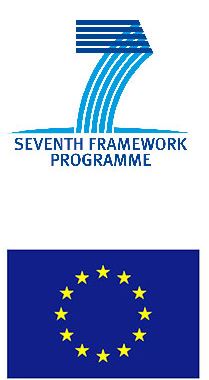EU Project THEORETICAL ANALYSIS, DESIGN AND VIRTUAL TESTING OF BIOCOMPATIBILITY AND MECHANICAL PROPERTIES OF TITANIUM-BASED NANOMATERIALS (FP7 Collaborative Project in Nanosciences on Theme NMP.2011.1.4-5 "Multiscale Modelling as a Tool for Virtual Nanotechnology Experimentation"-Coordinated call with Russia)
Coordinator: Dr. habil. Leon Mishnaevsky Jr., Senior Scientist (Risø DTU)
Participating European institutions:
1. Technical University of Denmark (DTU), Denmark
2. IMDEA Materials Institute (IMDEA), Spain
3. Katholieke Universiteit Leuven (KULeuven), Belgium
4. Goethe University Frankfurt am Main, FIAS, Germany
5. Technion, Israel
6. Timplant Ltd, Czech Republic
Seventh Framework Programme
Participating Russian institutions:
1. National University of Science and Technology “MISIS” Moscow
2. Ufa State Aviation Technical University, Ufa
3. Institute of Strength Physics and Materials Science, Tomsk
4. Scientific-Industrial Enterprise “Metal”, Moscow
5. NanoMeT Ltd., Ufa
WORK PACKAGE LIST:
1. Multiscale modeling of mechanical behavior and strength of biocompatible nanostructured titatium
2. Multiscale modeling of biocompatible nanostructured SMA and superelastic alloys
3. Modelling of biocompatibility of nanostructured titanium and Ti-alloys
4. Modeling of nanoindentation and mechanisms of localized deformation of nanostructured biomaterials
5. Management and coordination
See SLIDES FOR PERIODIC REVIEW, March 2013
STATEMENT AND GOALS:
This project is devoted to the development of multiscale models for the theoretical analysis, virtual testing and optimization of three main groups of nanostructured titanium-based metallic materials: pure titanium, Ti-Nb alloy and superelastic/shape memory Ti-Ni alloy. The idea of the project is to develop and validate a series of computational models for these materials at the atomistic, crystal/dislocation and grain/texture/microstructure levels, to explore their biocompatibility and mechanical properties, and to analyse the effect of atomistic, nano and microscale structures on the properties of these materials. Models based on the methods of molecular dynamics, dislocation dynamics, single crystal plasticity, polycrystal homogenization, discrete micromechanics are employed here to analyze the mechanical properties and biocompatibility of Ti-based nanomaterials.
The objectives of the project include:
Development of multiscale models of mechanical behaviour and strength of nanostructured titanium and biocompatible nanostructured Ti-based alloys with superelasticity and shape-memory, taking into account the atomistic, dislocational and nano- and microscale structures and properties of the materials,
Fundamental understanding of the physical mechanisms of deformation, strength, biocompatibility of nanostructured titanium and titanium based alloys,
Development and experimental validation of theoretical models of biological response of nanostructured titanium and titanium alloys.
Additional:
- Information about Leon Mishnaevsky Jr.
- Press Release
- Project Presentation
|
 |